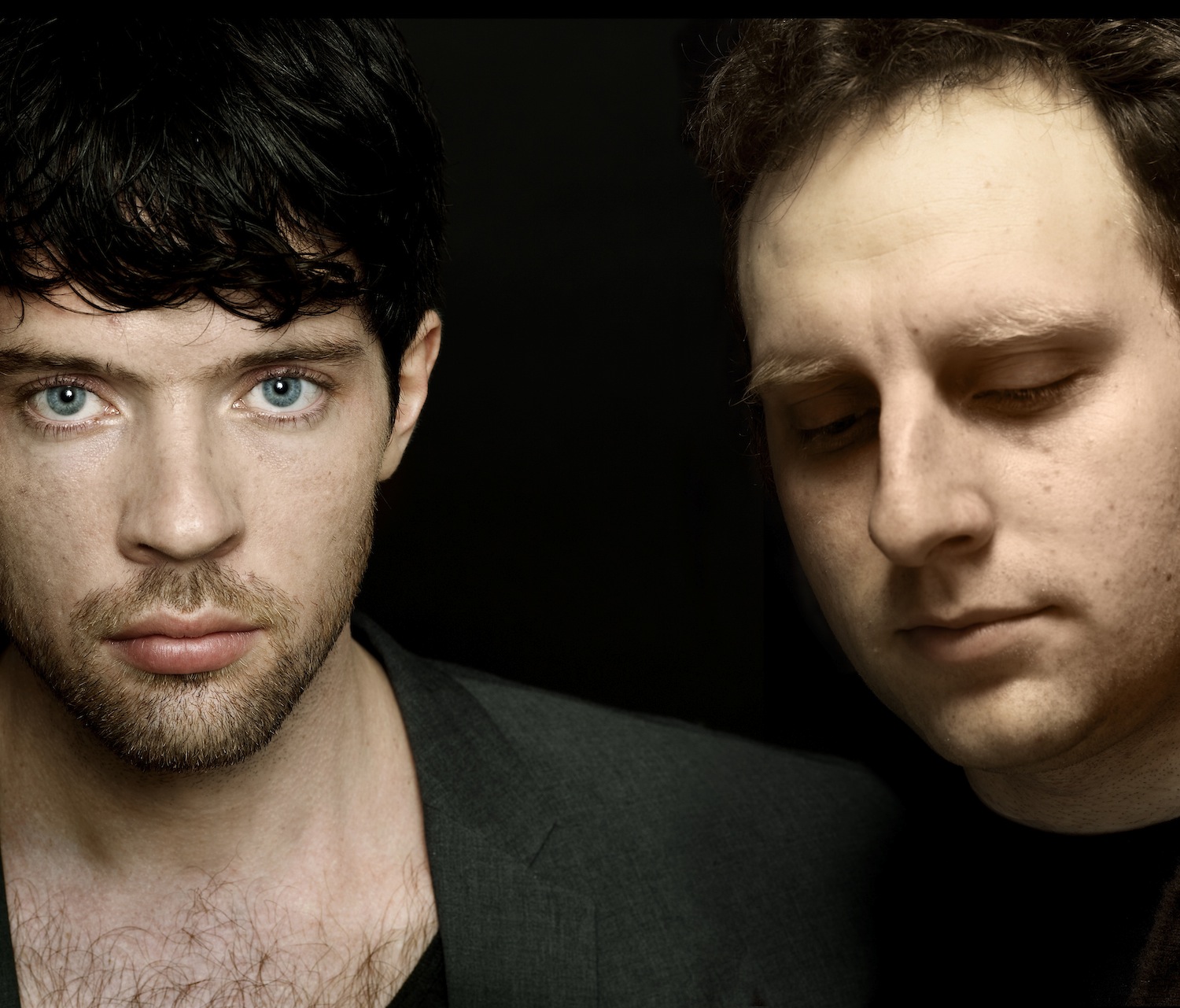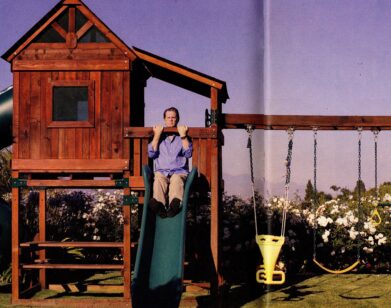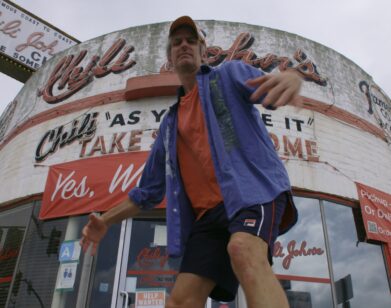Junior Boys’ Fine China

JUNIOR BOYS: MATT DIDEMUS (LEFT) AND JEREMY GREENSPAN. IMAGE COURTESY OF SACCENTI GLAUER
One-half of Junior Boys, the synth-pop electronic duo, is always on a transcontinental flight somewhere; and for their fourth album, Shanghai was the destination. Such sojourns might tire others, but for members Jeremy Greenspan and Matt Didemus, traversing the globe to create their music is par for the course. While Greenspan resides in Hamilton, Ontario, and Didemus in Berlin, Germany, the two musical partners refuse to connect over the convenience of the Internet. Good old-fashioned face time and good old-fashioned analog equipment are distinct hallmarks of the Junior Boys’ sound, and the quality control comes through on their latest venture, It’s All True.
The album, with its telling title, is more stripped-down and candid than their previous efforts. With playful, supple vocals from Greenspan and tempered, streamlined production, It’s All True is another one of those Canadian clichés: wholesome. But before anyone deigns to offer up a Molson, remember that with age comes wisdom—and for the Junior Boys, that’s meant less artifice and more honesty.
We recently held the mirror up to Greenspan so he could talk about the record and their upcoming tour, and found him—where else?—in transit.
JULIE BAUMGARDNER: Your albums seem to correspond to location, this time to China. What brought you to Shanghai?
JEREMY GREENSPAN: I went there because my sister lives there; she’s been there for almost a decade, and now she’s a professor at NYU Shanghai. She has always asked me to come, and I was finding it hard to find the time, because I didn’t want to go only for a week. I had just finished the Caribou record and had this free time, but I also wanted to do some recording so I thought it would a good opportunity to do it all. So I got my own apartment in the French Concession and stayed for two months.
BAUMGARDNER: Do you think your external environment or circumstances are necessary to create your music?
GREENSPAN: I’m definitely aware of what’s going on around me. It’s hard to say, because on one hand, I was quite isolated in the studio. The majority of this record was still made at my studio at home, which is in an extremely small, claustrophobic, and quite messy room. So my experience of writing was very much me getting into the headspace of always being in my studio; but with that said, you’re also always filtering in everything that’s going on with your life. So, obviously, when I was in China, I was not only filtering in the things I was experiencing, but also I enlisted recording musicians from China and incorporated more foreign sounds.
BAUMGARDNER: Thus, like your others, this album was recorded in separate stages.
GREENSPAN: Yes, our albums take a long time. In particular, with Matt [Didemus], when we’re working together, he comes in from Europe, so that adds some time to the whole process. But, we just like to take our time with it—it took about a year and a half to record, write, edit—it’s extended out from what an average alt band would do.
BAUMGARDNER: Is your music a synthesis of the experiences you’ve had, or is it a mish-mash of things you’ve picked up along the way?
GREENSPAN: I don’t know if I analyze things that specifically. Those are big questions of how is art made. As you are making your record, you’re not sitting there thinking to yourself, “What is inspiring about this?”. I know what I get into, and I get inspired by the environment and what’s going on in my life, but I also always add in some obsessive thing that I can’t stop thinking about. In the case of this record, I was thinking a lot about Orson Welles and his movies, and it became this extreme fixation and an impetus to try and write some of the ideas I was having. I wanted to write a record about all the things I was feeling, which was getting older, losing sight of the confidence you have when you’re younger, and that ilk. His major theme is people with a lot of promise in their youth who let it slip away. That’s what Citizen Kane is about, The Magnificent Ambersons is about, and what his life was all about.
I particularly latched on to his last movie, F for Fake, which tackles the questions about authenticity in artwork, and what’s true and phony in art. I felt like I didn’t have the right to say or talk about this stuff, because rarely are musicians supposed to talk about their career. They are just supposed to talk about the intimate details of their lives and not their music career. Music is not something you should feel entitled to, and I think saying you have a career in music is like the death nail of your career. But, I was feeling this way and wanted to be honest, then I felt like I had to talk about these issues. I didn’t know the means, or how to talk about it, and then when I saw the Orson Welles movie, I said, “This is how I do it,” because he was an artist talking about his own failures.
BAUMGARDNER: So through a candid and honest approach, is that how you keep a sense of diversity or freshness, or spontaneity in your music?
GREENSPAN: You see your albums as reflection of yourself, but for me, I think my albums have gotten more honest over time. The first album came from a useful place of just having fun, and being uncertain what to write about, so I just wrote about anything. The albums have become increasingly confessional-ized. On It’s All True, I was just commenting on pressures I felt that I think we weren’t living up to. I felt pessimistic about a lot things going on in music, because I had such strong feelings on how music used to be in my teenage years; and you’re never sure if the music was more meaningful when you’re younger because it was or because you were younger and more naïve about certain things.
BAUMGARDNER: You hung out with a really interesting group of people; you spent time with Kode9—
GREENSPAN: Yeah. At the time, I was living in England, and I was really into the electronic dance scene—it offered a lot of promise for what’s possible in music, but for rejecting certain tropes and clichés in music. Most important for me was that it was a culture based in really, really intense music listening. People went out clubbing to listen to music with really, really big sound systems in a super-intense, heightened sensory way. Now, it seems as though that music is now listened to in the worse possible circumstances, streaming on some terrible bandwidth off YouTube. You can’t compare the visceral and sensual experience. So for me, that was a big part of the pessimism.
BAUMGARDNER: It’s interesting that now Kode9 and Burial are also creating music with that nostalgic tone.
GREENSPAN: I think there’s a generation of people who grew up with the promise of dance music that feel let down, because ultimately dance music didn’t change music in the way that people thought it might or could have. That’s the fault of a lot of people making the music, because now dance music has become perverted and club culture has become something far less than what it was. It used to be that you would go to clubs to experience music, and you didn’t care who was playing insofar as biography or what they look like. When I used to go, DJs were all these weird, fat, ugly guys making this music in the moment. Now, when you go, it’s superstar DJs playing totally vacuous music to audiences who are way more concerned with what they look like in an alcohol- and cocaine-fueled binge of narcissism.
BAUMGARDNER: And documenting it for Facebook.
GREENSPAN: Exactly.
BAUMGARDNER: There’s a lack of spontaneity.
GREENSPAN: And a lack of just losing yourself in the moment. Back in the day, that’s what dance music was all about, and I lamented that loss more than anything. It’s really hard to come to terms with that frustration, because I am excited about new music. I’m not someone who likes to say, “Argh, music was better when I was young.”
BAUMGARDNER: You’re not a grumpy old man.
GREENSPAN: Ha, exactly, and when you start feeling these feelings, you think, “Holy shit, am I becoming some old curmudgeon?” I resent being that, I don’t want to be that person, so ultimately that was a huge source of anxiety for me. But also that’s why I was feeling old!
JUNIOR BOYS’ IT’S ALL TRUE IS OUT TODAY ON DOMINO RECORDS. FOR MORE ON THE DUO, VISIT THEIR MYSPACE.






